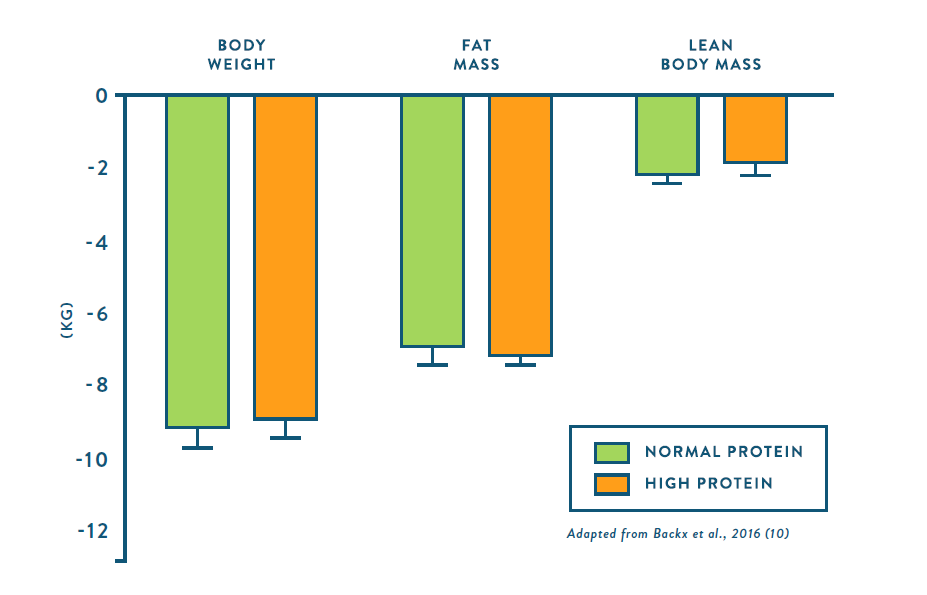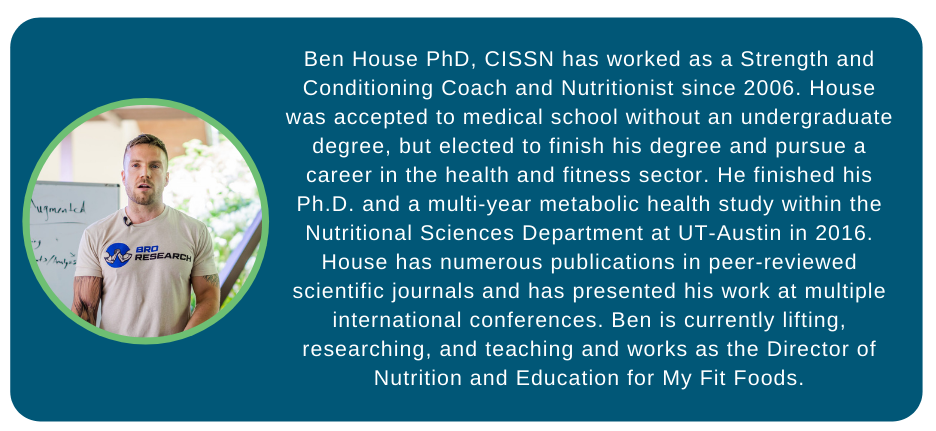This might seem surprising to you, but higher protein intake alone isn’t likely saving significant amounts of muscle on a diet [1-3].
Resistance training supported by adequate protein is what maintains and builds muscle on a diet [4-19].
A new study by Roth et al., 2021 [1] found that 46% of the weight subjects lost on a diet was from lean body mass even though protein was set at ~1 gram per pound.
The findings above were in healthy 25-year-olds who were honestly fairly active but were NOT resistance training and this finding has now been replicated on multiple occasions.

The figure above is adapted from another study with a similar design by Backx et al., 2016 [2] showing that a higher protein intake of ~0.8 grams per pound did not increase lean body mass retention during weight loss.
In comparison, with three days a week of a pretty vanilla circuit training routine and just 0.5 grams per pound of protein some older individuals (age of 55-65) were able to gain 1.5 pounds of muscle while losing 6 pounds of fat in 10 weeks [18].
To show you the power of resistance training even under non-ideal nutritional conditions, a mind-boggling study by Bryner et al. [19] found that when subjects consumed an 800 kcal liquid diet (~80 grams of protein or less than 0.4 g/lb) and performed a decent circuit training regimen three days a week for 12 weeks they lost 31.6 lbs of fat, maintained lean body mass, and had a 63 kcal jump in resting metabolic rate after 12 weeks.
WHAT!!!
They also got 23 to 48% stronger on all the tested exercises.
Whereas, the cardio and diet group lost 28.2 pounds of fat, while also losing 9.0 pounds of muscle and their resting metabolic rate decreased by a fairly whopping 211 kcals!
If you want the best of both worlds, combining a higher protein intake and resistance training you may be able to lose fat and gain significant amounts of muscle at the same time [8, 18]. This is called Body Recomposition which we have covered HERE!
Pure and simple, friends don’t let friends lose weight without resistance training.
#GIVEAFIT

REFERENCES:
1. Roth, C., L. Rettenmaier, and M. Behringer, High-Protein Energy-Restriction: Effects on Body Composition, Contractile Properties, Mood, and Sleep in Active Young College Students. Front Sports Act Living, 2021. 3: p. 683327.
2. Backx, E.M., et al., Protein intake and lean body mass preservation during energy intake restriction in overweight older adults. Int J Obes (Lond), 2016. 40(2): p. 299-304.
3. Englert, I., et al., Impact of Protein Intake during Weight Loss on Preservation of Fat-Free Mass, Resting Energy Expenditure, and Physical Function in Overweight Postmenopausal Women: A Randomized Controlled Trial. Obes Facts, 2021. 14(3): p. 259-270.
4. Pearson, A.G., et al., A hypoenergetic diet with decreased protein intake does not reduce lean body mass in trained females. Eur J Appl Physiol, 2021. 121(3): p. 771-781.
5. Layman, D.K., et al., Dietary protein and exercise have additive effects on body composition during weight loss in adult women. J Nutr, 2005. 135(8): p. 1903-10.
6. Mitchell, L., et al., Physiological implications of preparing for a natural male bodybuilding competition. Eur J Sport Sci, 2018: p. 1-11. 7. Hulmi, J.J., et al., The Effects of Intensive Weight Reduction on Body Composition and Serum Hormones in Female Fitness Competitors. Front Physiol, 2016.
7: p. 689. 8. Longland, T.M., et al., Higher compared with lower dietary protein during an energy deficit combined with intense exercise promotes greater lean mass gain and fat mass loss: a randomized trial. Am J Clin Nutr, 2016. 103(3): p. 738-46.
9. Hector, A.J., et al., Pronounced energy restriction with elevated protein intake results in no change in proteolysis and reductions in skeletal muscle protein synthesis that are mitigated by resistance exercise. FASEB J, 2018. 32(1): p. 265-275.
10. Cava, E., N.C. Yeat, and B. Mittendorfer, Preserving Healthy Muscle during Weight Loss. Adv Nutr, 2017. 8(3): p. 511-519.
11. Paoli, A., et al., Ketogenic diet does not affect strength performance in elite artistic gymnasts. J Int Soc Sports Nutr, 2012. 9(1): p. 34.
12. Huovinen, H.T., et al., Body composition and power performance improved after weight reduction in male athletes without hampering hormonal balance. J Strength Cond Res, 2015. 29(1): p. 29-36.
13. Campbell, D.D. and K.A. Meckling, Effect of the protein:carbohydrate ratio in hypoenergetic diets on metabolic syndrome risk factors in exercising overweight and obese women. Br J Nutr, 2012. 108(9): p. 1658-71.
14. Mettler, S., N. Mitchell, and K.D. Tipton, Increased protein intake reduces lean body mass loss during weight loss in athletes. Med Sci Sports Exerc, 2010. 42(2): p. 326-37.
15. Garthe, I., et al., Effect of two different weight-loss rates on body composition and strength and power-related performance in elite athletes. Int J Sport Nutr Exerc Metab, 2011. 21(2): p. 97-104.
16. Mero, A.A., et al., Moderate energy restriction with high protein diet results in healthier outcome in women. J Int Soc Sports Nutr, 2010. 7(1): p. 4.
17. Conlin, L.A., et al., Flexible vs. rigid dieting in resistance-trained individuals seeking to optimize their physiques: A randomized controlled trial. J Int Soc Sports Nutr, 2021.
18(1): p. 52. 18. Verreijen, A.M., et al., Effect of a high protein diet and/or resistance exercise on the preservation of fat free mass during weight loss in overweight and obese older adults: a randomized controlled trial. Nutr J, 2017. 16(1): p. 10.
19. Bryner, R.W., et al., Effects of resistance vs. aerobic training combined with an 800 calorie liquid diet on lean body mass and resting metabolic rate. J Am Coll Nutr, 1999. 18(2): p. 115-21.
